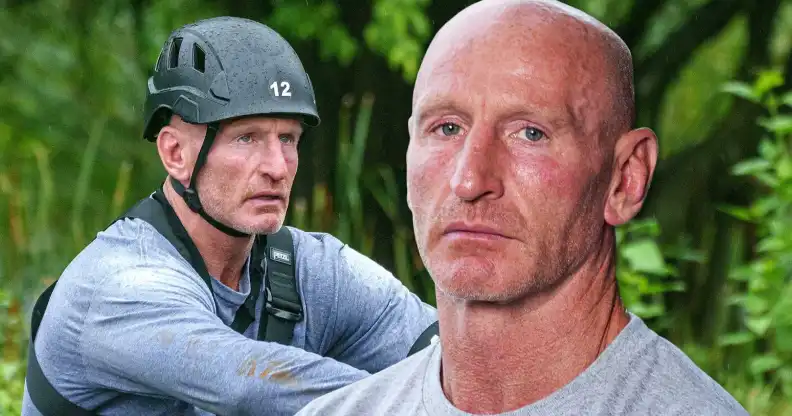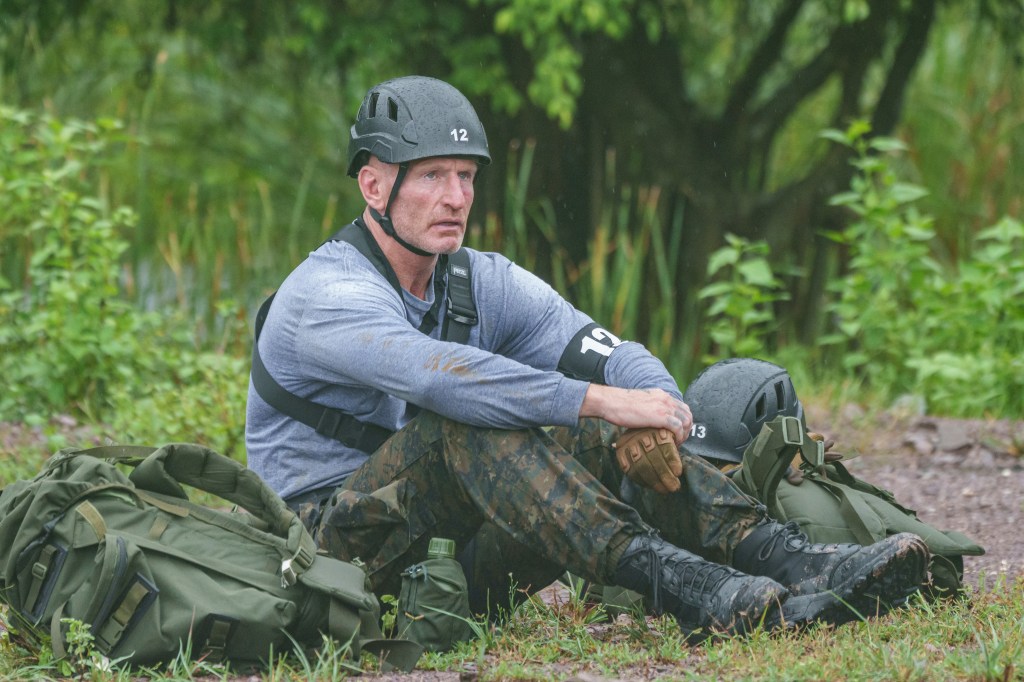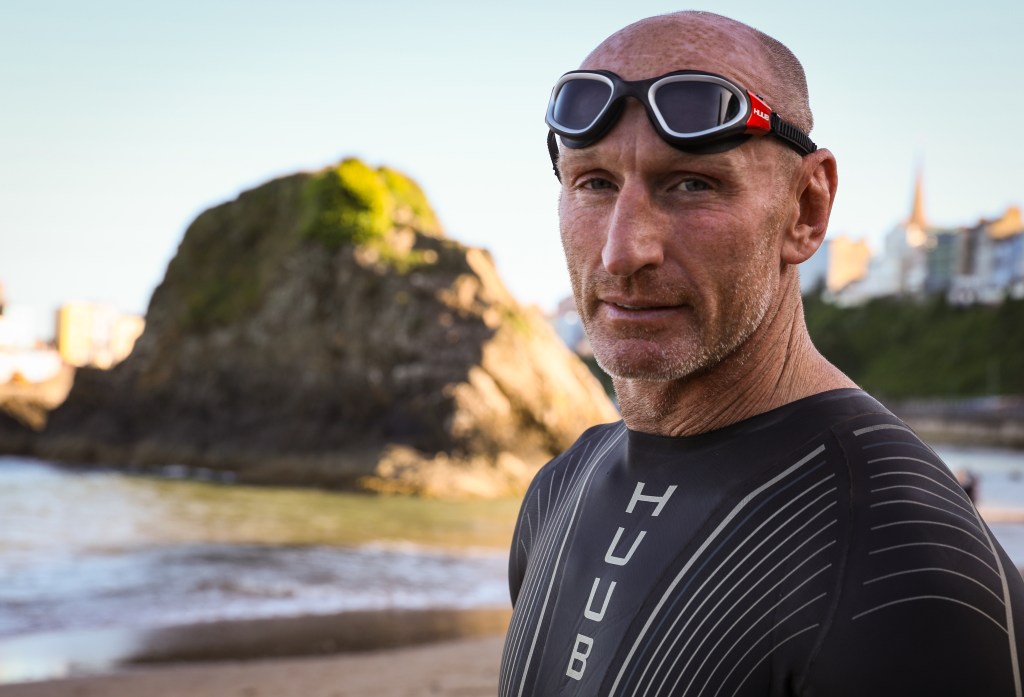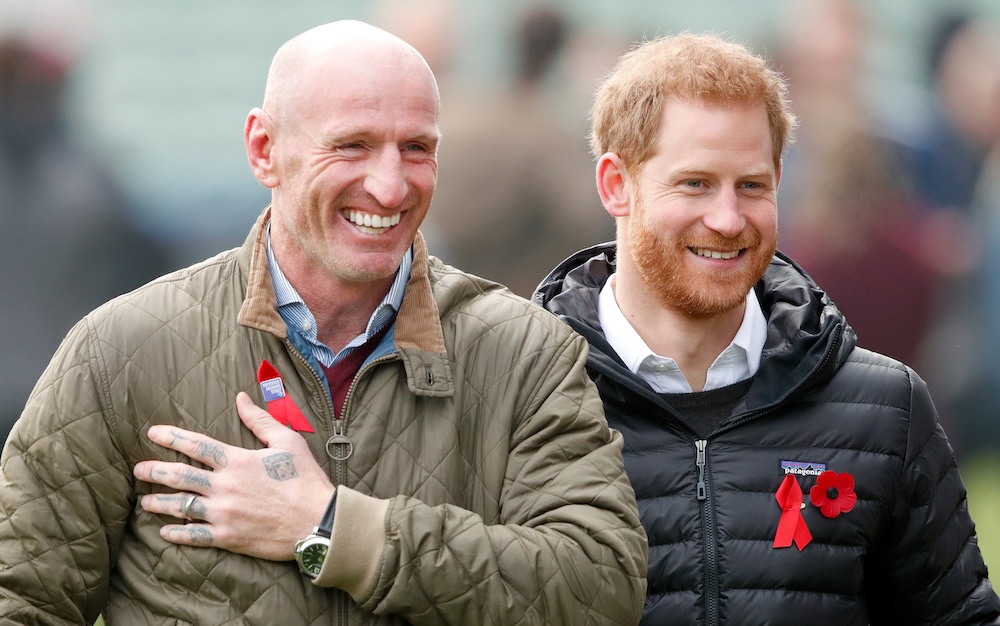Gareth Thomas on fighting for the LGBTQ+ community: ‘I have this passion and purpose to represent them’

It won’t come as a big surprise to see Thomas acing many of the challenges on Celebrity SAS: Who Dares Wins. (Channel 4)
Welsh rugby legend Gareth Thomas on finding purpose as an activist and pushing himself to the limit on Celebrity SAS: Who Dares Wins.
There aren’t many people who would voluntarily pack their bags and head to the most unforgiving jungle in the world to subject themselves to a gruelling military training programme. But after enduring one of the toughest tests of his life on Celebrity SAS: Who Dares Wins, Gareth Thomas didn’t find himself relishing the comforts of home. Rather, he found himself actually missing camp.
“Do you know what? I would like more anything in this f**king world to live my life like it was in that camp,” he declares, emphasising every vowel in his thick Welsh accent.
He’s speaking to me today from his pub in Bridgend in the heart of South Wales; a world away from the jungles of Thung Ui, North Vietnam, where he filmed the series a year ago.
“Okay, take away the spiders, and all the horrific tasks every day. But just to live a life where you can really feel like you belong, because your purpose is no greater, your purpose is no less than the person next to you. It was such an empowering feeling to have the sense of being the same”.
It’s a striking statement, but characteristic of the no-nonsense attitude with which Thomas approaches all areas of life, whether that’s embracing failure, (“the quickest route to success”) or fending off trolls on social media (“I just stand my ground”).
Once Wales’ most-capped rugby union player, and widely regarded as one of the most talented players of his generation, the 49-year-old rugby legend – nicknamed “Alfie” – is a familiar face on TV right now with his punditry for the Rugby World Cup.
Away from the showpiece men’s tournament, however, he’s also been competing in Channel 4’s hit reality show, which sees celebrity recruits being put through their paces by an elite team of ex-Special Forces operators.
No stranger to intense training, in 2019, Thomas completed a 140-mile Ironman triathlon to challenge misconceptions of living with HIV, just a day after publicly revealing that he was living with the condition. Signing up for Celebrity SAS, however, wasn’t a mission to prove that LGBTQ+ people aren’t weak.
“I’d like to think as a society, even though I feel there are some very backwards-thinking people out there, that we’ve gone past that,” he says breezily.
What he was interested in, however, was challenging people’s assumptions about the “alpha” individual associated with the military.
“Even though there’s a presence of gender difference and a sense of equality within the armed forces, I do feel that there is undoubtedly a subconscious stereotype that people assume when it comes to the military, especially special services.” The reality, he says, is something completely different. “
As strong as you have to be, you have to be very aware of other people, very empathetic towards other people to create an environment where everybody feels like they’re welcome.”
It won’t come as a big surprise to see Thomas acing many of the challenges on Celebrity SAS: standing at six feet, three inches of pure muscle, he is, as chief instructor Mark ‘Billy’ Billingham observes in the first episode, “an absolute unit”.
Designed to replicate the punishing stages of SAS selection, the show has already seen famous faces – which include the likes of former health secretary Matt Hancock, singer Michelle Heaton and TV personality Danielle Lloyd – taking on challenges such as milling, an extreme form of hand-to-hand combat, and beasting, a savage series of physical tasks used as punishment for breaching camp discipline.
“It was a shock to the system,” Thomas admits. “But I decided that I was going to metaphorically empty the tank.” Each physical challenge, he explains, would be completed within a matter of seconds. Then, he would start “digging in” to test his mental resilience. “It’s about knowing what I’m capable of doing in that moment,” he says. “And then by finding out that, I’ll find out eventually what I’m capable of being in the future”.
Not that taking part in the course was ever about self-discovery: “It’s not about finding out who I am, which is, I think, a very standard answer for a lot of people who are genuinely trying to find out who they are. I’m real comfortable with who I am. I look in the mirror and I’m very happy”.
For a public figure who has been a prominent force on the pitch since the 90s, Thomas is remarkably well-adjusted. Retired since 2011, these days, he’s a happily married man enjoying life’s simple pleasures in the small, Welsh town where he was raised.

“I live far from a privileged life,” he says. “I’d be lucky enough now and again to have a first class ticket on an aeroplane or a first class ticket on a train. I don’t know if that makes me privileged or not. But I’m very down to earth. I’m very grounded. I’m very much stuck in my roots.”
On the show, he enjoyed learning about his fellow celebrities’ stories; Zoe Lyons’ battle with alopecia, for instance, or Michelle Heaton’s struggles with alcohol addiction. “If a celebrity talks about a weakness in their life, then all of a sudden to the rest of society, they become even more vulnerable and even more of a target.”
Thomas knows all too well what it feels like to become a target. In 2009, he made history when he came out publicly at the age of 35, making him the first openly gay professional rugby player. The abuse was horrific: in a one-to-one chat with course instructors in the second instalment of Celebrity SAS, Thomas recalls hearing crowds of rugby fans chanting that he was a f****t for “90 minutes straight”.
Ten years down the line, he was forced to come out as HIV positive after a tabloid reporter doorstopped his unsuspecting parents asking them to comment on their son’s medical status. What was it like recalling those moments on national TV?
“Do you know what?,” he says thoughtfully. “It wasn’t about giving out to however many people watched it on television. It was about me being real.” It was important to him, he explains, to share his history with the instructors so they understood his purpose for being on the show.
“I needed to be open to the people who were in front of me, because I needed them to understand why I was there. I needed to go out there to understand why I have a sense of vulnerability, why I have a sense of strength, what’s driven me to this point, what’s really pushed me over the edge before. I needed them to know why I’m so extremely proud to represent what and who I represent because of what I’ve been through”.
Coming out of the jungle, he observed a newfound sense of clarity. “I felt so strong when I came out of there,” he says thoughtfully. “Well, no, I felt just so me. I just felt totally at ease with who I am, totally at ease with what I’m capable of doing in the future, totally motivated. I just felt really cleansed from all of that crap that sometimes that invades who you really are and distorts your thinking.”
If Thomas was once consumed with shame about his HIV status, these days, it’s been replaced by a drive to show people that you can be “whoever the hell it is you want to be”. In the years since his retirement, he’s experienced a kind of rebirth, dedicating himself to advocacy work around LGBTQ+ equality, mental health and HIV awareness.

Shortly after revealing that he was living with HIV, he released a myth-busting documentary, Gareth Thomas: HIV and Me, and in 2020, launched Tackle HIV, a public awareness and education initiative campaign in partnership with ViiV Healthcare and the Terrence Higgins Trust.
“I used to be afraid of the word of being an activist, because I always imagined an activist as somebody in an anorak, just standing by an oil drum, by the fire on the picket line,” he says. These days, he’s acutely aware of how quickly public attitudes can change if people aren’t vigilant about protecting hard-won rights.
“What I’ve found is that if people aren’t active, if people aren’t constantly voicing the want to move forward, then I feel like it’s really easy for us to fall back. It almost feels like activism right now is fighting just for where we are, to hold ground. And that’s what I’m extremely passionate about. I will not be silent. I will not lose my voice.”
Recently, Thomas has made big strides with Tackle HIV. To mark the start of the Rugby World Cup, he crossed borders for the first time with the Myth Bus Tour, touring host cities in France in a bid to address HIV stigma and promote testing among rugby fans. Soon after we speak, he makes headlines taking the bus on the road to Nottingham University to speak to students on campus, marking the first time he’s stopped off at a higher education institution as part of the campaign.
Changing lives, he says, is a “real purpose”, even though the prospect of facing the public is still daunting.
“I get up every day being petrified, because it’s scary as hell to stand at a bus in a really vulnerable environment that’s got HIV written all over bus, and understand that people might define you because they know you’ve got HIV. It’s a scary place to stand,” he says. “But when you have that purpose of activism to know that you’re going to hopefully make somebody’s life better who you’ll never meet,” he explains, then it makes “all the fear, all the vulnerability” worthwhile.
“I’ve got it easy compared to some people. So if me just standing here is hard, to make somebody’s else life easier, whose life is much harder than mine, then yeah, it’s worth doing.”

There’s a long way to go, though, before the macho world of rugby roots out homophobia. Fourteen years after Thomas came out, there remains only a handful of openly gay men in the rugby community.
“When we talk about equality and understanding what equal is, I don’t think rugby union would say, ‘Oh, well rugby union is okay because Gareth Thomas came out 10 years ago,” he says.
“I think it’s really easy for people to say, ‘look how far we’ve come because we’ve had these people do it, yet not very many have done it since then. Now we have what? Two, three, four? And that’s out of the millions of players that want to be professional rugby players, we have this very small amount.
“That isn’t good enough. You need to create an environment where you can show more equality, more diversity. It’s still an environment where society looks at a certain stereotype, and if they aren’t like that stereotype, then people will be like the stereotype to feel like they can belong in that environment.”
Having spoken out in favour of trans inclusion in sport, Thomas also remains frustrated with the bitter argument over whether trans athletes should be allowed to compete in sports categories congruent with their gender identity.
In 2022, the Rugby Football Union (RFU) Council and Rugby Football League (RFL) Board approved a new policy banning trans players from competing in rugby union and rugby league codes.
“This is a subject that is never going to be solved unless people sit around the table and are willing not to shout at each other, are willing to have a discussion,” he says. “Nobody is feeling like, you know what? Let’s sit down and have a discussion, but also have a discussion with the people that are in effect, because we’re talking about a very small minority of people who have it f**king hard anyway”.
One thing he does have control over, however, is ensuring that trans people who visit his pub feel welcome. “I make sure that everybody f**king understands that they have as much as the right to be here as anybody else.”
Thomas knows that sport isn’t just about “winning or losing”, and speaks passionately about its power as a unifying force. “It gets people way more than really to get to know our purpose, and it gives them a perfect and a sense of wellbeing, a sense of friendship, a sense of family, shared experiences with people and friendships.”
But he’s also a firm believer in the notion that sport is for everyone. “On the tagline for Rugby World Cup is ‘sport is for all’,” he says. “So understand what all is. All isn’t just men. All isn’t just women. All isn’t just gay. All isn’t just straight. All isn’t just bi. All is f**king all. If we’re going to say all sport for all, then we have to understand what all is and accept all”.
Having a platform to reach the nation with the Rugby World Cup isn’t something that he ever takes for granted, either. “The people in the community [that] hate me, love me, they don’t even know who I am, I want to be able to represent them in a really positive way,” he says. “I try to hold myself in a way that I would like the community to be proud of me, whether they are, whether they are not.”
Being able to stand on TV alongside people of “all different walks of life” and have a voice on something that is completely unrelated to his sexuality, is proof of progress. “Just the fact that I’m here is the sense of activism in itself”.
Tackle HIV is a campaign led by Gareth Thomas in partnership with ViiV Healthcare and Terrence Higgins Trust and aims to tackle the stigma and misunderstanding around HIV. For more information visit www.tacklehiv.org and follow @tacklehiv
How did this story make you feel?

